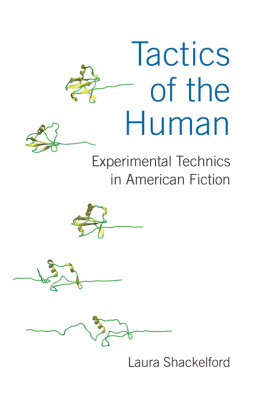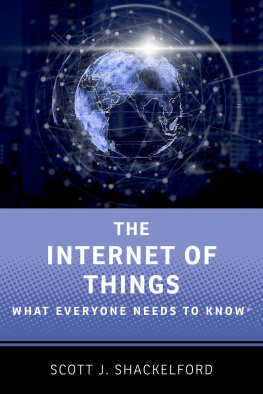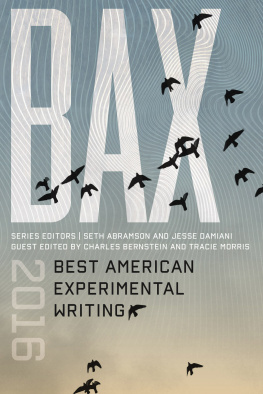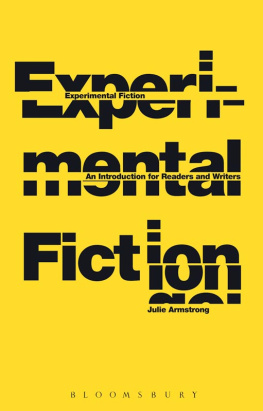Shackelford - Tactics of the Human: Experimental Technics in American Fiction
Here you can read online Shackelford - Tactics of the Human: Experimental Technics in American Fiction full text of the book (entire story) in english for free. Download pdf and epub, get meaning, cover and reviews about this ebook. year: 2018, publisher: The University of Michigan Press, genre: Romance novel. Description of the work, (preface) as well as reviews are available. Best literature library LitArk.com created for fans of good reading and offers a wide selection of genres:
Romance novel
Science fiction
Adventure
Detective
Science
History
Home and family
Prose
Art
Politics
Computer
Non-fiction
Religion
Business
Children
Humor
Choose a favorite category and find really read worthwhile books. Enjoy immersion in the world of imagination, feel the emotions of the characters or learn something new for yourself, make an fascinating discovery.
- Book:Tactics of the Human: Experimental Technics in American Fiction
- Author:
- Publisher:The University of Michigan Press
- Genre:
- Year:2018
- Rating:5 / 5
- Favourites:Add to favourites
- Your mark:
- 100
- 1
- 2
- 3
- 4
- 5
Tactics of the Human: Experimental Technics in American Fiction: summary, description and annotation
We offer to read an annotation, description, summary or preface (depends on what the author of the book "Tactics of the Human: Experimental Technics in American Fiction" wrote himself). If you haven't found the necessary information about the book — write in the comments, we will try to find it.
Shackelford: author's other books
Who wrote Tactics of the Human: Experimental Technics in American Fiction? Find out the surname, the name of the author of the book and a list of all author's works by series.
Tactics of the Human: Experimental Technics in American Fiction — read online for free the complete book (whole text) full work
Below is the text of the book, divided by pages. System saving the place of the last page read, allows you to conveniently read the book "Tactics of the Human: Experimental Technics in American Fiction" online for free, without having to search again every time where you left off. Put a bookmark, and you can go to the page where you finished reading at any time.
Font size:
Interval:
Bookmark:

DIGITAL CULTURE BOOKS, an imprint of the University of Michigan Press, is dedicated to publishing work in new media studies and the emerging field of digital humanities.
Experimental Technics in American Fiction
Laura Shackelford
University of Michigan Press
Ann Arbor
Copyright by Laura Shackelford 2014
Some rights reserved

This work is licensed under the Creative Commons Attribution-Noncommercial-No Derivative Works 3.0 United States License. To view a copy of this license, visit http://creativecommons.org/licenses/by-nc-nd/3.0/or send a letter to Creative Commons, 171 Second Street, Suite 300, San Francisco, California, 94105, USA.
Published in the United States of America by the
University of Michigan Press
Manufactured in the United States of America Printed on acid-free paper
Printed on acid-free paper
2017 2016 2015 2014 4 3 2 1
A CIP catalog record for this book is available from the British Library.
DOI: http://dx.doi.org/10.3998/dcbooks.12672514.0001.001
Library of Congress Cataloging-in-Publication Data
Shackelford, Laura.
Tactics of the human : experimental technics in American fiction / Laura Shackelford.
pages cm
Includes bibliographical references and index.
ISBN 978-0-472-07238-5 (hardback : alk. paper) ISBN 978-0-472-05238-7 (paper : alk. paper) ISBN 978-0-472-12068-0 (e-book)
1. American fictionHistory and criticism. 2. Literature and technologyUnited States. 3. Human body and technology in literature. 4. Hypertext fictionHistory and criticism. 5. Literature and the InternetUnited States. 6. Experimental fiction, AmericanHistory and criticism. I. Title.
PS374.T434S53 2014
813.009356dc23
2014023464
This book bears the marks of its intellectual and scholarly emergence, traversing several academic institutions, scholarly fields, and lively, ongoing dialogues. A few of these catalyzing forces and influences deserve special mention and recognition. Thomas Foster and Eva Cherniavsky have had an irreplaceable influence on this project since its earliest threads emerged through my dissertation work, under their advising, at Indiana University, Bloomington. I could not have found a more insightful and enlightening dissertation director than Tom. They continue to motivate me with their practice and vision of what scholarly work might entail. Purnima Bose and Helen Gremillion were similarly generous and circumspect contributors to the earliest trajectories that led to this book. Since I first attended the Society for Literature, Science, and the Arts (SLSA) conference in Buffalo, New York, to participate on a systems theory and literature panel, this diverse community of scholars, Katherine Hayles, especially, has been an incredible source of critical exchange and a much-needed, recognizable context for an area of study that has been peripheral until quite recently. Many of the ideas developed here have grown out of those conversations, networks, and exchanges. During a postdoctoral fellowship at Penn State University, Michael Brub and the American literary studies working group offered me an attentive audience and feedback on an earlier version of . More recently, my colleagues at the Rochester Institute of Technologys College of Liberal Arts and, particularly our informal junior faculty writing group, have provided a crucial transdisciplinary audience for the project. Doris Borelli, Katie Terezakis, Elena Sommers, Cecilia-Ovesdotter Alm, and Sharon Beckford-Foster have been meticulous, thoughtful readers and provided insightful comments on individual chapters, as well as invaluable support and humor through the process of writing and revising.
The intellectual prompting and friendship of Louise Economides and Cristina Iuli are a continual source of insight and inspiration for me to pursue Page viii trajectories that realign expected scholarly and intellectual affiliations. I owe my first realization of humanities research as a collaborative, interdisciplinary activity to my experiences organizing and hosting the Thinking Materiality: Language, Epistemology, and Embodiment lecture series with them, as well as other stellar Indiana University faculty. This also initiated my first genuine interactions with scholars such as Andy Clark who made a lasting influence on my lines of inquiry here. The final stages of the book have also been thoroughly invigorated by Loss Pequeo Glazier and others active in the International E-Poetry Organizations events that he has organized at University of Buffalo, Kingston University, and the University of Mayagez over the past three years. His sustained efforts to build on the communities of practice catalyzing and sustaining the digital literary have fed their way into my own work in a number of significant ways. I also owe an incredible debt to my thoughtful editor, Thomas Dwyer, for his unflagging support and guidance of my book project. I would also like to thank the anonymous readers who reviewed the manuscript for the University of Michigan Press. Their feedback was very helpful to me in consolidating the books framing for multiple audiences.
The process of writing and revising this book has also been punctuated by visits and conversations with my mother Lynn; my sisters Kathy and Amy; my brilliant, kind, and most special niece Amber; and countless walks with Clyde the unstoppable, yet accommodating beagle-mix. A continual source of insight and a welcome reorienting of my usual trains of thought, they have each found their way into my thinking and purpose here. To them I remain especially grateful.
An earlier version of was originally published as Counter-networks in a Network Society: Leslie Marmon Silkos Almanac of the Dead, Postmodern Culture 16.3 (2006). Copyright 2006 Laura Shackelford and The Johns Hopkins University Press. Revised and reprinted with permission by The Johns Hopkins University Press.
This book returns to a series of American fictions published between 1991 and 2002, in the midst of the digital revolution,
The literary texts at the center of the books inquiries attend to dynamic modes of interchange between textual practices, material technologies, material spaces, intersubjective social relations, economic circulation, and political forms such as the nation-state. Their intensive exploration of how computation-based digital technologies differentially enter into and facilitate subjectivities and social relations focuses much-needed attention onto these pivotal relays between writing technologies, textual practices, subject formation, social systems, and lived space. They also encourage a reconsideration of the kinds of work these literary practices can do. Through this early lens, the book rethinks how literary texts and a broader literary system participate in contemporary digital cultures. This overarching question continues to unsettle the literary and will certainly keep modern-day Scheherazades, attempting to answer it, alive for quite some time. Yet as Ill illustrate, it bears directly on how one understands and navigates these increasingly pervasive, dynamic digital cultures in the present.
Drawing on these literary texts, the book develops a mode of thinking through what many cultural theorists now acknowledge as a fundamentally distinct set of posthumanist perspectives on the humans relations to technologies emerging out of postWorld War II scientific and cultural practices. Scientific practices draw and redraw the discursive, material, and technical threads linking human to animal to technology to lifeworld and back again. For instance, the life of the cell has recently jumped into silicon via some of these threads and will likely reenter the human, in due course. Researchers have just inserted Page 3 artificial DNA molecules, not previously existing, into an organism. Electrical devices implanted into the brain by roboticists stimulate synapses enabling one, through focused concentration, to move a paralyzed limb. Frog cells grown in petri dishes are soon to be marketed as an animal-friendly, tissue-cultured meat for human consumption. Although such practices are becoming commonplace, they continue to raise new questions about the boundaries of the human and the consequence of this fundamental malleability, plasticity, and interconnectivity with material, technical, and discursive domains. They generate competing efforts to make sense of the human and to assess the current and/or potential impact of such practices on multiple dimensions of social life.
Font size:
Interval:
Bookmark:
Similar books «Tactics of the Human: Experimental Technics in American Fiction»
Look at similar books to Tactics of the Human: Experimental Technics in American Fiction. We have selected literature similar in name and meaning in the hope of providing readers with more options to find new, interesting, not yet read works.
Discussion, reviews of the book Tactics of the Human: Experimental Technics in American Fiction and just readers' own opinions. Leave your comments, write what you think about the work, its meaning or the main characters. Specify what exactly you liked and what you didn't like, and why you think so.












